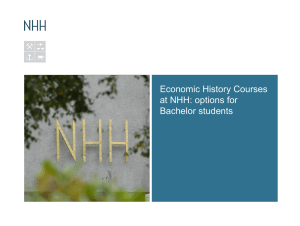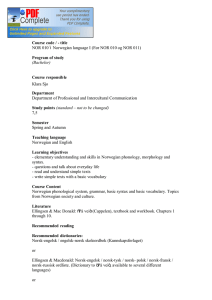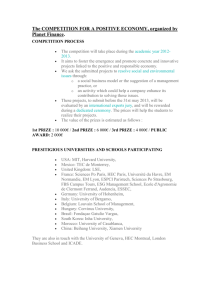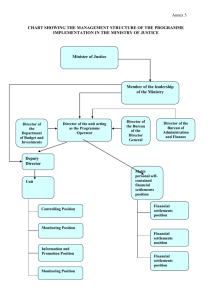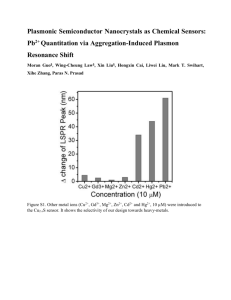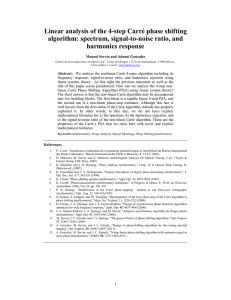ENG1111 – The English Language. Awareness
advertisement
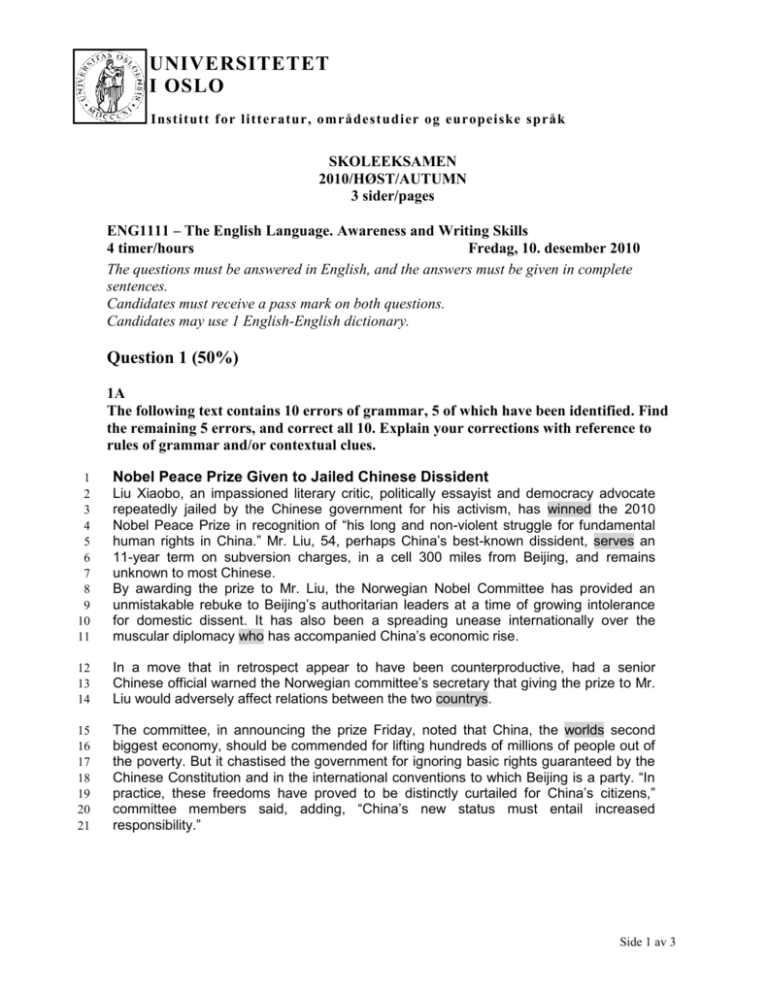
UNIVERSITETET I OSLO Institutt f or litteratur, områdestudier og europeiske språk SKOLEEKSAMEN 2010/HØST/AUTUMN 3 sider/pages ENG1111 – The English Language. Awareness and Writing Skills 4 timer/hours Fredag, 10. desember 2010 The questions must be answered in English, and the answers must be given in complete sentences. Candidates must receive a pass mark on both questions. Candidates may use 1 English-English dictionary. Question 1 (50%) 1A The following text contains 10 errors of grammar, 5 of which have been identified. Find the remaining 5 errors, and correct all 10. Explain your corrections with reference to rules of grammar and/or contextual clues. 1 2 3 4 5 6 7 8 9 10 11 Nobel Peace Prize Given to Jailed Chinese Dissident 12 13 14 In a move that in retrospect appear to have been counterproductive, had a senior Chinese official warned the Norwegian committee’s secretary that giving the prize to Mr. Liu would adversely affect relations between the two countrys. 15 16 17 18 19 20 21 The committee, in announcing the prize Friday, noted that China, the worlds second biggest economy, should be commended for lifting hundreds of millions of people out of the poverty. But it chastised the government for ignoring basic rights guaranteed by the Chinese Constitution and in the international conventions to which Beijing is a party. “In practice, these freedoms have proved to be distinctly curtailed for China’s citizens,” committee members said, adding, “China’s new status must entail increased responsibility.” Liu Xiaobo, an impassioned literary critic, politically essayist and democracy advocate repeatedly jailed by the Chinese government for his activism, has winned the 2010 Nobel Peace Prize in recognition of “his long and non-violent struggle for fundamental human rights in China.” Mr. Liu, 54, perhaps China’s best-known dissident, serves an 11-year term on subversion charges, in a cell 300 miles from Beijing, and remains unknown to most Chinese. By awarding the prize to Mr. Liu, the Norwegian Nobel Committee has provided an unmistakable rebuke to Beijing’s authoritarian leaders at a time of growing intolerance for domestic dissent. It has also been a spreading unease internationally over the muscular diplomacy who has accompanied China’s economic rise. Side 1 av 3 1B The examples below contain language choices that are awkward or inappropriate. First, suggest ways of improving them; second, explain what you have done and why. a. The lady in the blue and green sweater with a dog under her arm and a cat round her neck’s name is Gertie. b. Having five miles left to go, the lights of my car stopped working. c. The recently published book thinks that the evidence used for convicting Treholt was planted. Question 2 (50%) Read the two texts below. a. Identify the similarities and differences between the two texts as regards field, tenor, mode, purpose and style, and describe how any differences in these areas are reflected in lexical, grammatical, and syntactic choices. Provide examples from both texts to support your claims. Your answer should be in the form of an academic essay. Write at least 500 words. b. Rewrite the highlighted part into a colloquial style suitable for children aged 1013. Text 1 1 Operation Spy Novel 2 The time seems ripe for a revival of the spy novel. The genre flat-lined in the 1990s, the 3 first victim of the Cold War's demise. But now all the ingredients are back, encased in 4 different labels—terrorists instead of Communists, the fear of dirty bombs instead of 5 hydrogen ones—but otherwise all too pungently familiar. The prospective plotlines could 6 be torn right off the front pages—and, in a way, that's the problem. 7 John le Carré, the master of the craft, whose career tumbled along with the Berlin 8 Wall, has rushed back into action. His new book, Absolute Friends, is billed as a tale of 9 personal loyalty and political commitment in the new age of terrorism, counter-terrorism, 10 American pre-eminence, and pre-emptive warfare. But that's not really what it is at all. 11 The book does start out that way, but after the first 100 pages, le Carré resorts to 12 the technique that he fell back on in The Secret Pilgrim (his first and worst post-Cold War 13 work): the flashback. The middle half of the book, plus some, is a long reminiscence in 14 which our two main characters, Ted Mundy and Sasha (the "absolute friends" of the title), 15 veer uneasily from adventurous revolutionaries to spying for Mother England from the 16 1960s through the 1980s, the Cold War's peak years—and, we can't help but notice, le 17 Carré's too. It's an opportunity (or an excuse?) for le Carré to tromp through old stomping 18 grounds, and he lays out the nifty techniques of spycraft and the inner anguish of the 19 secret life with gusto. Certainly it's his best-written work since The Russia House. 20 But when he snaps out of his reverie and returns to current affairs, he's at a loss. 21 There's a cartoonish mysterious tycoon who may or may not be linked to Arab terrorists. Side 2 av 3 22 The scheme for which he recruits our two protagonists is so silly—such an obvious cover- 23 story for something more nefarious—that you don't know whether to lose interest in the 24 characters (for suddenly being stupid enough to go along with it) or in the author (for 25 devising such a vapid plot twist). Text 2 1 Norway to probe evidence in espionage case against ex-diplomat 2 On Friday, an independent Norwegian review panel said it would study the evidence used 3 to convict a former top diplomat who in 1985 was given a 20-year sentence for espionage. 4 Recent book and newspaper disclosures have suggested that some of the evidence 5 against Arne Treholt may have been fabricated. 6 "These are very serious allegations - both in the actual (Treholt) case and against 7 the Norwegian justice system," Helen Sæter, head of the Norwegian Criminal Cases 8 Review Commission, told a televised news conference. 9 Treholt, now 67, was arrested in 1984 and given a 20-year sentence the following 10 year for handing over classified information to the Soviet Union and the Iraqi intelligence 11 service. Since his 1992 release for health reasons, Treholt has tried to clear his name. 12 The review commission in 2008 rejected an appeal from Treholt to get a new 13 hearing. After Friday's announcement, Treholt told news agency NTB it was "a box on the 14 ear of the Norwegian Prosecuting Authority", headed by Tor-Aksel Busch, one of the 15 original prosecutors in Treholt's trial. According to the new book Forfalskningen and 16 newspaper accounts, the secret police illegally bugged Treholt's Oslo apartment and also 17 fabricated evidence to secure a conviction, including wads of cash photographed in 18 Treholt's briefcase during a secret search of the flat prior to his arrest. 19 Busch issued a statement welcoming the commission's decision. Earlier this week 20 Busch asked the commission to review some of the evidence over speculation that some 21 of it might have been fabricated. Sæter said the commission, which was created in 2004, 22 would start the review immediately, but she could not say when it would be completed. 23 Begrunnelse: Ta kontakt med din faglærer på e-post innen 1 uke etter at sensuren er kunngjort i StudentWeb. Oppgi navn og kandidatnummer. Sensor bestemmer om begrunnelsen skal gis skriftlig eller muntlig. Explanation: For an explanation of the mark obtained, contact the teacher responsible for the course no later than 1 week after the exam results have been published in StudentWeb. Remember to include your name and candidate number. The examiner will then decide whether to give a written explanation or call you in for an interview. Side 3 av 3
